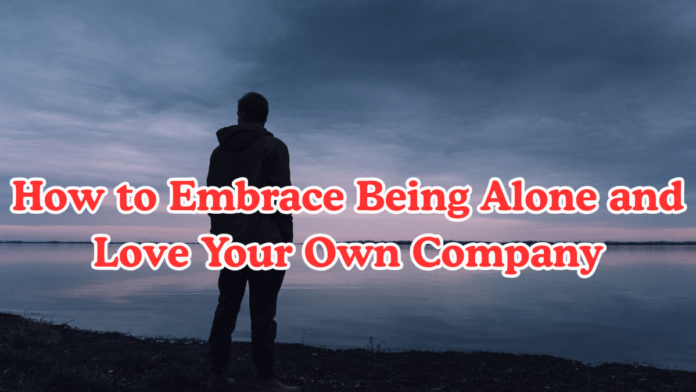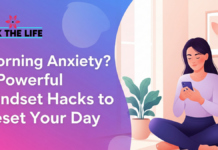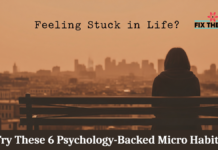Being alone doesn’t have to mean being lonely. In fact, time spent alone can be one of the most powerful tools for growth, creativity, and emotional clarity. In a world that constantly pushes us to stay connected, learning how to embrace being alone is a skill that can unlock inner peace and lasting self-confidence.
This isn’t about isolating yourself—it’s about becoming so comfortable with your own presence that external validation stops controlling your self-worth. Let’s break down how to shift your mindset, enjoy solitude, and discover deep self-love in solitude.
How To Enjoy Your Own Company
1. Reframe Alone Time as Empowering, Not Empty
Most people view alone time as a void—as something to be avoided. But the first step in learning how to embrace being alone is to reframe it.
New mindset: Being alone isn’t a sign of lacking something. It’s an opportunity to build something: clarity, confidence, peace.
Real-world example: Many creatives and leaders—from Virginia Woolf to Steve Jobs—credit solitude for their best ideas and insights. Alone time fuels reflection and innovation.
2. Create Rituals That Make Solitude Meaningful
Being alone isn’t enough. You have to enjoy it. That means designing routines and rituals that make your solo time something to look forward to, not just “dead air.”
Try this: Cook a meal just for yourself. Take a solo nature walk. Read something enriching. Create a playlist just for quiet evenings.
Self-love in solitude tip: Treat your solo time like a date with someone important—because it is.
3. Disconnect to Reconnect
Digital noise can trick your brain into thinking you’re never alone—even when you physically are. But real solitude requires presence.
What to do: Set tech boundaries. Try going offline for an hour or two each day. Resist the reflex to fill quiet moments with scrolling.
Why it matters: A 2021 study published in Nature Communications found that excessive social media use is linked to increased feelings of loneliness—not less.
4. Get Comfortable With Silence
Most of us fill silence out of discomfort. But silence is where self-awareness lives. When you stop drowning it out, you start hearing what matters.
Start small: Sit in silence for five minutes a day. No music. No phone. Just you and your thoughts. Let it be awkward at first—it gets easier.
Enjoying solitude insight: The more you learn to sit with your thoughts, the less you fear them.
5. Use Solitude for Self-Discovery, Not Just Escape
Alone time isn’t about hiding from the world—it’s about checking in with yourself.
Practical tip: Journal about what’s been on your mind. Ask yourself questions like “What am I avoiding?” or “What do I actually want right now?”
Growth bonus: The more honest you are in solitude, the more authentic you can be in public.
6. Learn to Self-Soothe
You don’t need someone else to comfort you when you’re upset or anxious. That power can come from within.
Strategies to try:
- Deep breathing or meditation
- A calming ritual like making tea or taking a bath
- Writing a letter to yourself from a kind, encouraging voice
Why it matters: Learning to self-soothe builds emotional independence and resilience.
7. Celebrate the Freedom
Solitude isn’t a sentence—it’s a superpower. You can do what you want, how you want, when you want.
Shift your lens: Alone time gives you creative control over your day. You don’t need compromise or permission.
Pro tip: Plan a solo adventure—like a weekend trip or museum visit. Discover the joy of doing something just for you.
FAQs
Is there a difference between being alone and being lonely?
Yes. Being alone is a physical state. Loneliness is emotional. You can be surrounded by people and feel lonely—or be alone and feel deeply fulfilled.
Why do I feel uncomfortable when I’m alone?
Discomfort often comes from unaddressed emotions or a fear of missing out. Facing that discomfort is the first step toward making peace with solitude.
Can enjoying solitude hurt my relationships?
No. In fact, it can improve them. When you’re comfortable with yourself, you stop clinging or over-relying on others for validation.
How do I start enjoying solitude if I’ve never liked it?
Begin with small blocks of time—10–15 minutes—and do something you enjoy. Over time, extend those periods and try more reflective activities like journaling or meditating.
Final Thought
Learning how to embrace being alone isn’t about cutting people off. It’s about building a foundation so solid that you never feel incomplete without others. Solitude can be a sanctuary, not a sentence. When you start enjoying your own company, you unlock a quieter kind of confidence—one that doesn’t depend on who’s around, but who you are.




